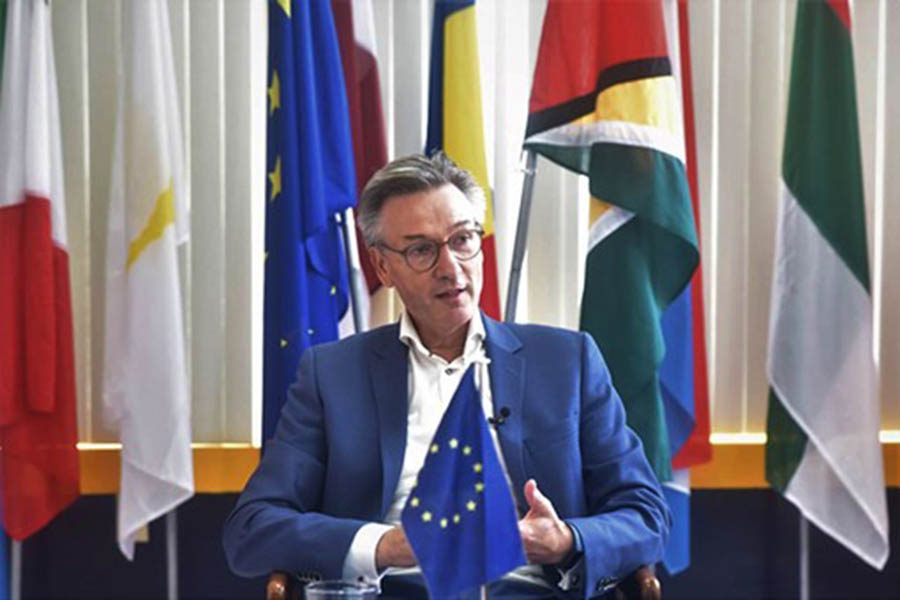Through its Global Gateway initiative, the European Union is planning to inject larger amounts of cash into the Community of Latin American and Caribbean States (CELAC), and its representative here in Guyana, Ambassador René van Nes, says that Guyana could significantly benefit.
While there are a number of areas for Guyana, the major focus from the financing model will be on the forestry, education, and health sectors, alongside research, climate and energy.
“For Guyana we have agreed with the government on a few of those Global Gateway [initiatives],” the EU envoy said during an interview with reporters on Thursday as he pointed out that the initiatives were hugely ambitious.
“We have a big programme on the forest sector and it is all about helping to preserve the forest, but in doing that, recognising that you can only be successful if you create alternative livelihoods for people that work and live in the forest… can you provide these people alternative livelihoods so that they don’t have to depend on the timber industry. Can you reduce your deforestation by creating value added? Don’t export logs, export furniture. You have a higher value added while you use less trees,” he added.
He pointed to the clean water programme where the European Investment Bank and the Caribbean Development Bank are funding the construction or upgrade of seven water treatment facilities across Guyana and said that discussions are currently ongoing around off-grid solar power supply for areas in the hinterlands.
Ahead of the EU CELAC Summit, slated for Monday and Tuesday in Brussels, the EU envoy said that challenges and opportunities would be discussed with the aim of strengthening the relationship between the two sides.
As it pertains to opportunities, discussions on the new model of infrastructure project financing will be discussed as it relates to the Global Gateway initiative and van Nes explained the changes to the financing model.
“It is different. In the past we would say this is a project – be it a bridge, hospital, school – we are going to finance that… the Global Gateway is a different approach. This is an approach where we say we can… use our resources to leverage much larger investment projects and we do that with very big financial institutions like the European Investment Bank, like the IDB, like the Caribbean Development Bank.
“Can we bring European Investment Bank, the IDB, and the CDB…? Can we bring in those investment banks in the process? And a very crucial partner is the private sector. Can we work together with the PS [private sector] and these investment banks and our money, which is always grant money; these monies are always a gift and not a loan. Can we use it to leverage a much bigger investment?” he continued.
According to van Nes, this new approach would also entail the EU’s funding of feasibility studies on larger versions of identified projects, to encourage international investment banks and the private sector to inject their cash.
Last month, the High Representative and the European Commission had set out a New Agenda for relations between the EU and CELAC, aimed at creating what it says is a stronger, modernised strategic partnership through reinforced political engagement and boosting trade and investment.
It had pointed out in a press release, that the EU-CELAC Global Gateway Investment Agenda (GGIA) is a political commitment to work together, identifying fair green and digital investment opportunities in Latin America and the Caribbean, which will benefit from the open environment generated by trade and investment agreements and will help achieve the Sustainable Development Goals.
Green hydrogen
It said that investments will be mobilised for, amongst others, renewable energy and green hydrogen, critical raw materials, decarbonisation, and transport infrastructure projects, 5G and last-kilometre connectivity, digitalisation for public services, sustainable forest management, health manufacturing, education and skills, and sustainable finance.
The EU said that Latin America and the Caribbean are key allies to defend and strengthen a rules-based international system; noting that “together, we represent almost one third of the membership of the United Nations (UN),” while adding, “we are strong supporters of international law and the UN Charter.”
It had also stated that the region was vital to the ecological balance of the planet, with over 50% of the planet’s biodiversity and is also a major food producer, accounting for 14% of global food production and 45% of net international agri-food trade, and a renewable energy powerhouse as its generation mix has the largest share of renewables in the world, amounting to 61% in 2021.
The plan makes a series of proposals in areas it says are key, which include renewed political partnership; strengthening common trade agenda; rolling out global gateway investment strategies to accelerate fair green and digital transition and tackle inequalities; joining forces for justice, citizen security and the fight against transnational organised crime; working together to promote peace and security, democracy, rule of law, human rights and humanitarian aid; and building a vibrant people-to-people partnership.
Regarding political partnership, the release notes that this is planned to be boosted at the bi-regional, sub-regional, bilateral, and multilateral levels. At the bi-regional level, it proposes to enhance dialogue between the EU and CELAC, with more regular summits and a permanent coordination mechanism.
Off-grid
And here in Guyana, the EU wants to also help government to develop an off-grid solar energy programme because there are quite a few communities out there that are not “on the grid” in this country that still do not have access to electricity.
“For those not on the grid, we can have off-grid solar in these communities. Government is already doing a lot and we are talking to them to see how we can support this,” he said.
There is also a host of other programmes surrounding clean water that have already started with the CDB. “Guyana wants to build and upgrade seven water treatment plants, to make sure that everywhere around the country you open the taps you have potable water… water that is safe and of quality standard.”
In health, the EU is helping to facilitate the possibility of Guyana, Barbados, and Rwanda, working together to engage in pharmaceutical production. van Nes pointed out that the EU had helped Rwanda set up its own pharmaceutical facility and if that can be mirrored in the Caribbean it would excellent.
According to the Ambassador, the idea was first mooted by Barbadian Prime Minister Mia Mottley and President Irfaan Ali and they also initiated a discussion “where they said they wanted to look at producing pharmaceuticals in Barbados and Guyana.”
He said that currently, “We actually have people that are coming up and down. We have experts who already came to Guyana to look at possibilities.”
He was quick to remind that the EU’s role was not of an investor or decision maker in demanding which countries assist or can guarantee private sector investment. “Of course, it is not the EU that is going to invest. What we want is to bring European [private sector] companies to Guyana to Barbados…” he said so that they can see for themselves if both countries had both the regulatory and investment climate for pharmaceutical production.
It is why the EU will “first try and will not put all our eggs in this basket” and will periodically evaluate how the new initiative is working here.
“It is not that we are just going all in with all the chips on that and now it’s only the Global Gateway. It is a new track slowly developing alongside our traditional way of working. So we will do both and if we’re successful, then we will probably expand that and we may be more successful in some countries than in other countries,” he surmised.









